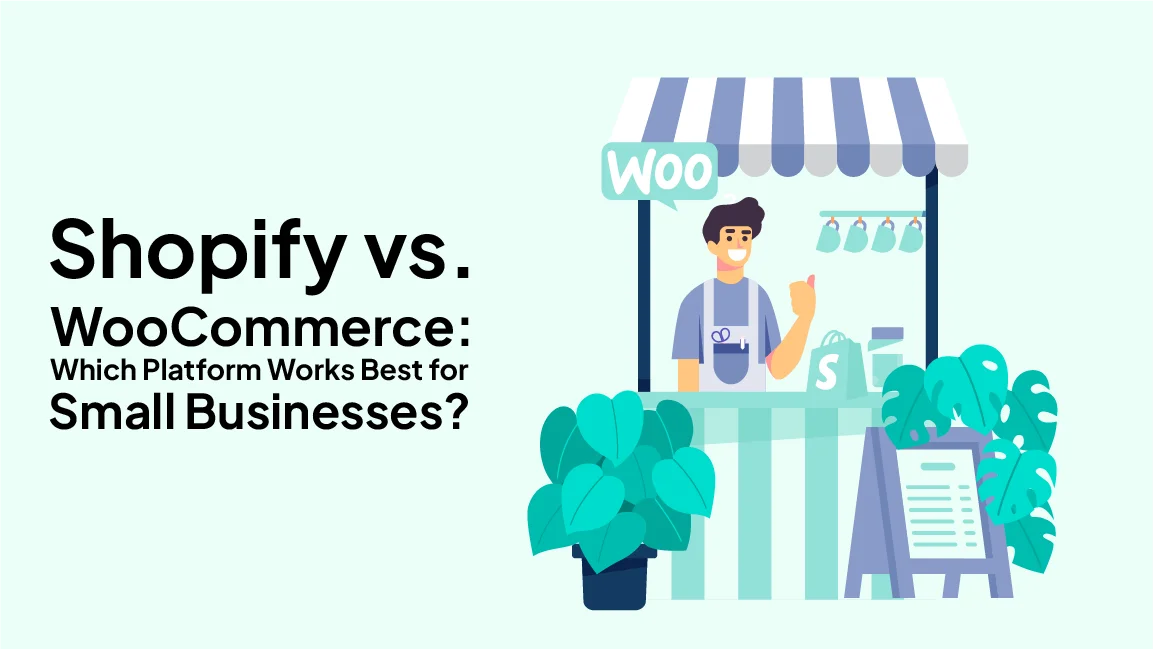Choosing the right eCommerce platform is a critical decision for any small business looking to establish or expand its online presence. Shopify and WooCommerce are two of the most popular options, each offering unique benefits. Shopify provides an all-in-one, hosted solution with ease of use, while WooCommerce, a WordPress plugin, offers greater customization and flexibility.
For small businesses, the choice between Shopify and WooCommerce depends on several factors, including budget, technical skills, scalability, and long-term business goals. In this article, we’ll break down the key differences and help you determine which platform is the best fit for your business.
1. Ease of Use: Which Platform is More Beginner-Friendly?
For small business owners without technical experience, ease of use is a major consideration. Shopify stands out in this area because it provides a fully hosted solution, meaning everything from hosting to security updates is handled for you. The setup process is straightforward, allowing users to launch their store quickly.
WooCommerce, on the other hand, requires more setup. Since it’s a WordPress plugin, users need to have a self-hosted WordPress site first. Installing and configuring WooCommerce involves choosing a hosting provider, setting up a domain, and installing necessary plugins. While the learning curve is steeper than Shopify, WooCommerce provides more flexibility for those comfortable managing their own website.
For beginners looking for a hassle-free experience, Shopify is the better option. However, if you already have a WordPress site or prefer more control, WooCommerce can be a great choice.
2. Cost Comparison: What’s More Budget-Friendly?
Budget is often a key factor for small businesses, and the pricing structures of Shopify and WooCommerce are quite different.
- Shopify Pricing: Starts at $39 per month for the Basic plan, with additional costs for apps, themes, and transaction fees (unless using Shopify Payments). Higher-tier plans provide more features, but they come at a higher cost.
- WooCommerce Pricing: The plugin itself is free, but you’ll need to pay for hosting (around $10–$30 per month), a domain, and security features. Additionally, premium themes, plugins, and payment gateway fees can add to the overall cost.
Shopify’s fixed pricing makes it easier to predict monthly expenses, while WooCommerce allows businesses to scale costs based on their specific needs. If you prefer a low upfront cost, WooCommerce is more budget-friendly, but Shopify provides a streamlined experience with built-in support.

3. Customization and Flexibility: Which Platform Offers More Control?
Customization is an important factor for businesses looking to create a unique brand identity. WooCommerce, being open-source, offers complete flexibility. You can modify everything, from the design to the functionality, through custom coding or plugins. With thousands of themes and plugins available, businesses can tailor their store to fit specific needs.
Shopify, while offering customization through themes and apps, has limitations. The platform uses its own coding language, Liquid, which makes deep customization more complex. Businesses looking for an easy drag-and-drop solution may find Shopify’s themes sufficient, but those wanting full control will find WooCommerce more accommodating.
For small businesses that want a simple setup, Shopify’s customization options are often enough. However, if you require unique features or integrations, WooCommerce is the better choice.
4. Payment Options and Transaction Fees
When it comes to accepting payments, both platforms support multiple gateways, but there are differences in pricing and flexibility.
- Shopify Payments is Shopify’s default gateway, which eliminates transaction fees. However, if you choose third-party gateways like PayPal or Stripe, Shopify charges an additional transaction fee (starting at 2%).
- WooCommerce supports a wide range of payment gateways without additional platform fees. Businesses can integrate PayPal, Stripe, Square, or even local payment methods without extra charges from WooCommerce itself.
For businesses looking to minimize transaction fees and have more control over payment processing, WooCommerce is the better option. Shopify’s built-in payment system, however, makes setup simpler for those who want an all-in-one solution.
5. Scalability: Which Platform Grows with Your Business?
As small businesses expand, they need a platform that can handle growth without performance issues. Shopify offers built-in scalability, meaning as traffic and sales increase, the platform automatically adjusts to meet demand. There’s no need to worry about hosting or performance optimization, making it a hassle-free option for growing businesses.
WooCommerce scalability depends on hosting. As a business grows, it may need to upgrade hosting plans or optimize the website to handle more traffic. While WooCommerce offers more control over performance, it requires technical management to scale efficiently.
For businesses that want to scale without technical concerns, Shopify is the better choice. However, WooCommerce provides more flexibility for businesses that want full control over their hosting and website performance.
6. SEO and Marketing Capabilities
Search engine optimization (SEO) is crucial for driving organic traffic, and both Shopify and WooCommerce offer strong SEO features.
- WooCommerce excels in SEO because it runs on WordPress, which is known for its strong SEO capabilities. With plugins like Yoast SEO, businesses can optimize content, meta tags, and URLs more effectively.
- Shopify provides built-in SEO features, but customization is limited compared to WooCommerce. While you can optimize titles, descriptions, and URLs, Shopify’s rigid URL structure may affect SEO performance.
For businesses focused on SEO-driven growth, WooCommerce is the better choice. Shopify still performs well in search rankings, but WooCommerce provides more tools and flexibility for optimization.

7. Support and Maintenance: Which Platform Requires Less Work?
Customer support and ongoing maintenance are important considerations for small business owners.
- Shopify provides 24/7 customer support via chat, phone, and email. Since it’s a hosted platform, Shopify handles security, updates, and performance optimization, reducing the technical workload for business owners.
- WooCommerce relies on community support, as it’s an open-source platform. While there are plenty of forums, tutorials, and third-party developers available, there’s no official customer service. Maintenance tasks such as updates, security patches, and backups are the store owner’s responsibility.
For business owners who prefer hands-off maintenance, Shopify is the better option. Those comfortable managing their own site, or working with a developer, may prefer WooCommerce’s flexibility.
8. Which Platform is the Best Choice for Small Businesses?
The choice between Shopify and WooCommerce depends on business needs, technical expertise, and long-term goals.
- Choose Shopify if you want a user-friendly, all-in-one solution with built-in hosting, security, and support. It’s ideal for small businesses that want a hassle-free eCommerce experience.
- Choose WooCommerce if you prefer full control over your store, need advanced customization, and want to minimize platform fees. It’s best for businesses that are comfortable managing their own website or working with a developer.
Ultimately, both platforms have their strengths. Shopify simplifies the process and is great for beginners, while WooCommerce offers more flexibility and cost control. Small businesses should evaluate their specific needs to determine which platform aligns best with their goals.
Schlussfolgerung
Both Shopify and WooCommerce offer powerful solutions for small businesses, but the right choice depends on your specific needs and priorities. Shopify is ideal for those who want a simple, all-in-one platform with minimal technical involvement. Its ease of use, built-in hosting, and customer support make it a great choice for business owners who prefer a hassle-free approach.
On the other hand, WooCommerce is the go-to option for businesses that prioritize flexibility, customization, and cost control. While it requires more setup and ongoing maintenance, it offers greater freedom in design, functionality, and payment processing.
Need expert guidance on choosing the right platform? BrandCrock specializes in custom Shopify and WooCommerce solutions tailored to your business goals. Kontaktieren today!







